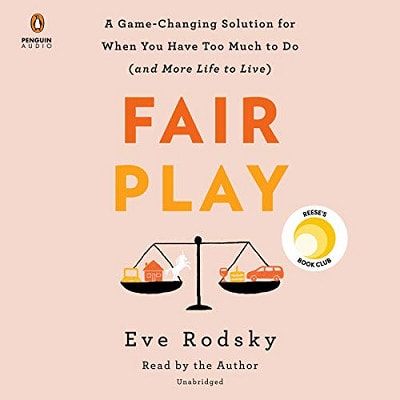Sharing the Load: Conception, Planning & Execution
This post may contain affiliate links and CorporetteMoms may earn commissions for purchases made through links in this post. As an Amazon Associate, I earn from qualifying purchases.

So a few weeks ago I listened to the audiobook of Fair Play, by Eve Rodsky. There are a TON of interesting ideas in it, but something that I think we need to discuss first is something she calls CPE – Conception, Planning, and Execution. When your partner “takes” a task, do they do the entirety of the task themselves — or do you find yourself doing part of the task for them? How do you feel about your partner doing the entirety of a task?
{related: how to get help when you’re “the default parent”}
This post contains affiliate links and CorporetteMoms may earn commissions for purchases made through links in this post. For more details see here. Thank you so much for your support!
Her whole book is based on the idea that partners should split tasks among themselves (she has a card deck you can buy that lists the 100 different tasks), and that whichever partner takes the task be completely responsible for conception, planning, and execution.
Here’s how she describes it in the book (pages 114-115), noting that professional organizations regularly use this kind of organizational system to accomplish things:
Let’s say you hold the ‘groceries’ card. Your kid is a big fan of mustard on his hot dog. You notice there is no mustard in the refrigerator or the pantry. That’s Conception. You add mustard to the grocery list that you create every week. You schedule when you’ll go to the store and consult your partner and anyone else helping around the house for any add-ons to the list. That’s Planning. You go to the grcoery store so that the mustard is restored to the fridge before your son takes a bite (of what you like to think is the best hot dog in the world, because it’s made with love — and mustard.) That’s Execution.
Within the Fair Play system, playing for CPE requires that whoever holds a task card Conceives, Plans, and Executes the heck out of it — without reminders, half-ass efforts and excuses, or soliciting a ‘good job’ for completion. If you’re thinking: Yeah, right. That’s unrealistic and not the way we do things around here, or would ever do things, let me stop you. … I [have] observed over and over again that the couples who adhere to the Fair Play CPE approach experience the most dramatic shifts away from dysfunction, resentment, and passive-aggressive behaviors in their relationship and toward more time-saving efficiency and feelings of fairness in the home.
In other words, when both people completely own their sh*t, it’s not only far more efficient, but there is far less nagging (huge benefit to husbands) and a significant lift in the mental load (huge benefit to wives).
So whenever I read something like this, I honestly go back to the time I wrote about being totally overwhelmed as the default parent, and asking my husband to help pick up the slack. Sure thing, babe — just tell me what you need me to do.
Even when I wrote that post, I didn’t truly get it — that’s the entire crux of the problem! In so many people’s systems the other partner doesn’t know what needs to be done, or how to conceive/plan it, which leaves you “assigning” them tasks to execute. Occasionally. If you tell them exactly what to do. And… maybe remind them a few times to do it. (But I’m sure that’s just me, right guys?) And meanwhile, all the other things that need to be conceived, planned and mostly executed are just flying around in your head.
{related: how to share parenting duties with your spouse}
So we’ll have a new series discussing how to share the load with your partners — but first let’s discuss the general organizational system you use. Does the CPE system from Fair Play make sense to you — or do you prefer another sort of system? (Do you have a Kanban board like we wrote about in our post on sharing emotional labor with your partner?)
Stock photo via Stencil.
{related: what to know about weaponized incompetence}


What do you do when your hours/availability are just not event? My husband and I both work demanding jobs, but he just doesn’t have the capacity for much outside of work. What do you do when the division of labor just can’t be stacked evenly? I worry there’s creeping resentment on my end…
I read fair play and like the concept, but what do you when your hours/availability are just not equal? My husband and I both work demanding jobs, but his work right now is exceedingly brutal (surgical residency). I’m not making excuses for him, but he just truly doesn’t have the capacity for much beyond work right now. What do you do when the division of labor just can’t be stacked evenly? Admittedly, there’s probably some creeping resentment on my end.
just throwing this out there: my husband has ADHD. Once I realized what that actually means in terms of how he processes information and his ability to make and execute on plans, the battles over division of labor got a lot better. I am a planner. I manage the family calendar and make a lot of lists of what needs to be done by when. If my husband has a task or a problem that needs a solution and a near-term deadline, he’s great at getting it done.
My husband is completely missing the “Conception” part. Now what? How do you teach someone to OPEN THEIR EYES and notice things?
The example seems like a pretty long, drawn out way of describing a fairly simple thing. Whoever notices we need mustard adds it to the shared google doc for groceries that is used to create the curbside pickup order.